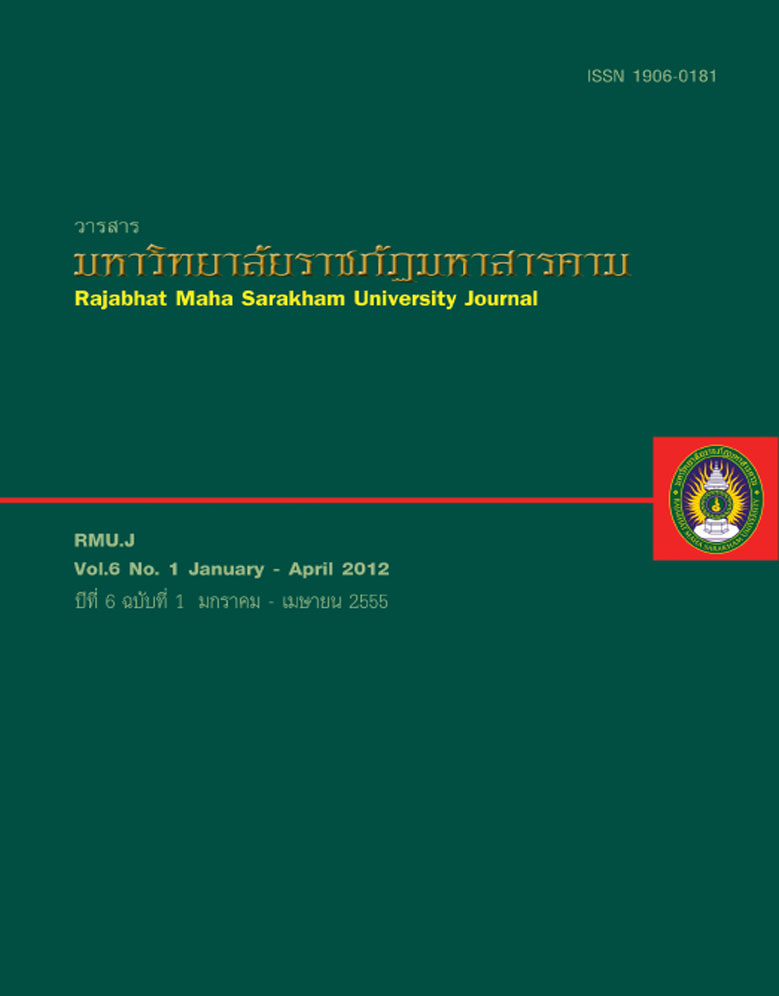การเปรียบเทียบผลของการเรียนแบบวัฎจักรการเรียนรู้ 7 ขั้น โดยใช้เทคนิคการรู้คิด กับการเรียนแบบปกติที่มีต่อแนวความคิดเลือกเกี่ยวกับมโนมติชีววิทยา : การย่อยอาหาร การหมุนเวียนเลือดและก๊าซและการกำจัดของเสีย และการคิดวิเคราะห์ของนักเรียน ชั้นมัธยมศึกษาปีที่ 2
Main Article Content
บทคัดย่อ
การวิจัยครั้งนี้มีความมุ่งหมายเพื่อศึ
กษาและเปรียบเทียบผลการเรียนแบบวัฏจักรการเรียนรู้ 7 ขั้น โดยใช้เทคนิคการรู้คิด กับ
การเรียนแบบปกติที่มีต่อแนวความคิดเลือกเกี่ยวกับมโนมติชีววิทยา : การย่อยอาหาร การหมุนเวียนเลือดและก๊าซ และการกำจัด
ของเสีย และการคิดวิเคราะห์ ของนักเรียนชั้นมัธยมศึกษาปีที่ 2 ที่มีความเข้าใจธรรมชาติวิทยาศาสตร์ต่างกัน จำนวน 51 คน ซึ่ง
ได้มาจากการสุ่มแบบเจาะจง แล้วแบ่งออกเป็น 2 กลุ่ม คือ กลุ่มทดลองจำนวน 26 คน เรียนแบบวัฏจักรการเรียนรู้ 7 ขั้น โดยใช้
เทคนิคการรู้คิด 3 ประการ คือ ความสามารถเข้าใจได้ ความสามารถเชื่อถือได้ ความสามารถในการนำไปใช้อย่างกว้างขวาง และกลุ่ม
ควบคุมจำนวน 25 คน เรียนแบบปกติ เครื่องมือที่ใช้ในการเก็บรวบรวมข้อมูลได้แก่ แผนการจัดการเรียนรู้ เรื่อง การย่อยอาหาร การ
หมุนเวียนเลือดและก๊าซ และการกำจัดของเสีย สำหรับกลุ่มทดลองและกลุ่มควบคุม กลุ่มละ 5 แผน แผนละ 1 สัปดาห์ สัปดาห์ละ
3 ชั่วโมง และแบบทดสอบ 2 ชุด คือ แบบทดสอบวัดแนวความคิดเลือกเกี่ยวกับมโนมติชีววิทยาการย่อยอาหาร จำนวน 5 ข้อ
มโนมติการหมุนเวียนของเลือดและก๊าซ จำนวน 7 ข้อ และมโนมติการกำจัดของเสีย จำนวน 3 ข้อ และแบบทดสอบวัดการคิดวิเคราะห์
จำนวน 30 ข้อ จำนวน 3 ด้าน และแบบวัดความเข้าใจธรรมชาติวิทยาศาสตร์ สถิติที่ใช้ในการวิเคราะห์ข้อมูล ได้แก่ ร้อยละ ค่าเฉลี่ย
ส่วนเบี่ยงเบนมาตรฐาน Chi-square test, Paired t-test, และ F-test (Two-way ANCOVA) ผลการวิจัยพบว่า
1. นักเรียนโดยส่วนรวม และจำแนกตามระดับความเข้าใจธรรมชาติวิทยาศาสตร์ ที่เรียนแบบวัฏจักรการเรียนรู้ 7 ขั้น โดย
ใช้เทคนิคการรู้คิด มีความเข้าใจอย่างสมบูรณ์มากกว่า แต่มีแนวความคิดที่ผิดพลาดเกี่ยวกับมโนมติชีววิทยาทั้ง 3 มโนมติน้อยกว่า
นักเรียนโดยส่วนรวมและจำแนกตามระดับความเข้าใจธรรมชาติวิทยาศาสตร์ ที่เรียนแบบปกติ อย่างมีนัยสำคัญทางสถิติที่ระดับ .05 2. นักเรียนที่เรียนแบบวัฏจักรการเรียนรู้ 7 ขั้น โดยเทคนิคการรู้คิด มีการคิ ดวิเคราะห์โดยรวม และเป็นรายด้าน 2 ด้าน
คือ ด้านความสัมพันธ์และด้านหลักการ มากกว่านักเรียนที่เรียนแบบปกติ อย่างมีนัยสำคัญทางสถิติที่ระดับ .05
3. นักเรียนที่มีความเข้าใจธรรมชาติระดับสูง มีการคิดวิเคราะห์โดยรวม และเป็นรายด้าน 2 ด้าน คือ ด้านความสำคัญ
และด้านความสัมพันธ์มากกว่านักเรียนที่มีความเข้าใจธรรมชาติวิทยาศาสตร์ระดับตํ่า อย่างมีนัยสำคัญทางสถิติที่ระดับ .05
4. ไม่มีปฏิสัมพันธ์ระหว่างระดับความเข้าใจธรรมชาติวิทยาศาสตร์กับรูปแบบการเรียนต่อการคิดวิเคราะห์โดยรวมและรายด้าน;
This study aimed to investigate and compare the 7E learning cycle with matacognitive techniques and
the traditional learning approach on alternative conceptions of some biology concepts : digestion, circulation
of blood and gases, and excretion, and analytical thinking of 51 grade 8th students with different understanding
levels of the nature of science, who were purposively selected . They were assigned to an experimental
class of 26 students who learned using the 7E learning cycle approach with 3 matacognitive techniques:
intelligibility, plausibility, and wide-applicability ; and a control class of 25 students who learned using the
traditional learning approach. The instruments employed in the study included 5 learning plans for the experimental
class and 5 learning plans for the control class, each for 3 hours of learning in each week ; a test
on alternative conceptions of digestion with 5 items, circulation of blood and gases with 7 items, and
excretion with 3 items ; a test on thinking abilities with 3 subscales and 30 items ; and the questionnaire
on the understanding of the nature of science with 94 items. The statistics employed for analyses of the
collected data were a percentage, a mean, a standard deviation ; for testing hypotheses, the statistics used
were the Chi-square test, the Paired t-test, and the F-test (Two-way ANCOVA).
The major findings revealed the following :1. The students as a whole, the high understanding students and the low understanding students in the
experimental class showed more instances of a sound understanding and fewer instances of misconceptions
of those three mentioned biology concepts than the counterpart students in the control class at the 0.05 level
of significance.
2. The experimental class students showed more analytical thinking skills in general and two subscales
in analysis of relations and analysis of principles than those of the control class students at the 0.05 level of
significance.
3. The high understanding students revealed more analytical thinking skills in general and two subscales
in analysis of elements and analysis of relations than those of the low understanding students at the 0.05
level of significance.
4. Statistical interactions of learning approach with understanding of the nature of science on analytical
thinking skills in general an in each subscale were not found to be significant.
Article Details
1. บทความที่ลงตีพิมพ์ทุกเรื่องได้รับการตรวจทางวิชาการโดยผู้ประเมินอิสระ ผู้ทรงคุณวุฒิ (Peer Review) สาขาที่เกี่ยวข้อง อย่างน้อย 3 ท่าน ในรูปแบบ Double blind review
2. ข้อคิดเห็นใด ๆ ของบทความที่ลงตีพิมพ์ในวารสารมหาวิทยาลัยราชภัฏมหาสารคาม นี้เป็นของผู้เขียน คณะผู้จัดทำวารสารไม่จำเป็นต้องเห็นด้วย
3. กองบรรณาธิการวารสารมหาวิทยาลัยราชภัฏมหาสารคาม ไม่สงวนสิทธิ์การคัดลอกแต่ให้อ้างอิงแสดงที่มา


